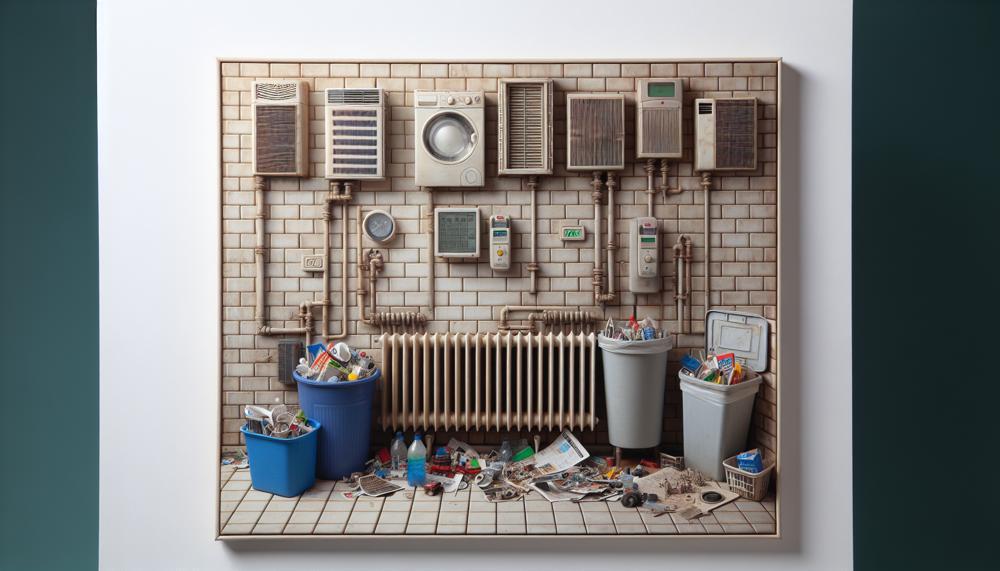Are you tired of constantly shelling out money to replace your radiators every few years? Are you looking for a way to be kinder to the environment while also saving some cash? Well, today we’re tackling the topic of recycling radiators.
So, can you recycle radiators?
Yes, radiators can be recycled. The process involves smelting the radiator’s metal to separate it into its components, which are then collected and reused to create new products. Radiators are mostly made of metal, so they can be a good item to recycle and turn into cash. You can take your radiators to a scrap metal yard, where they can use the metals, such as cast iron and stainless steel, plus you might even earn a bit of extra cash on your scrap radiators.
So let’s dive in and discover how we can make a positive impact on our planet while still keeping our homes warm and cozy.
Get ready to join the movement and recycle those radiators.
Contents
Recycling Radiators
There are various ways to recycle radiators, including donating them to scrap metal recycling facilities, selling them to repair shops or salvage yards, or choosing a reputable recycling facility for proper disposal. Each method has its own benefits and contributes to the overall effort of promoting eco-friendly practices.
Donating old radiators to scrap metal recycling facilities is a great way to contribute to the circular economy by reusing valuable materials. These facilities sort, break down, and melt down the radiators to create new products. This not only reduces the need for new production but also conserves natural resources and helps to reduce waste in landfills. In addition, some facilities may even provide financial compensation for the donated radiator.
Another option is to sell radiators that are still in good condition to repair shops or salvage yards. This not only extends the life of the radiator but also provides financial compensation for the seller. Additionally, it reduces waste in landfills and promotes a more sustainable approach to disposing of old radiators.
Choosing a reputable recycling facility or business is crucial when it comes to proper disposal of hazardous materials found in radiators. This not only ensures the protection of the environment but also helps to conserve natural resources and reduce waste in landfills. Proper preparation of radiators for recycling is important and involves draining all fluids and removing any contaminants.
Where to Recycle Radiators
When it comes to recycling old radiators, there are various options you can consider. Each option offers its own unique benefits, and it’s up to you to choose the one that works best for you.
Whether you donate, sell, recycle or repurpose your old radiators, it’s important to dispose of them properly to protect the environment and preserve valuable materials. Let’s take a closer look at these options.
- Donate: If your old radiator is still in good condition, consider donating it to a local charity or second-hand store. This not only extends its lifespan but also allows someone else to make use of it.
- Sell: If you’re looking to make some cash out of your old radiators, selling them to scrap yards or companies that specifically buy radiator scraps is a viable option. Keep in mind that the value of your radiator will depend on its material and condition.
- Recycle: Choosing a reputable recycling facility is another responsible way to dispose of old radiators. These facilities have the necessary equipment and expertise to safely recycle them and extract valuable materials such as copper, aluminum, and steel.
- Repurpose: For those feeling creative, repurposing old radiators into new items is always an exciting option. From using them as furniture pieces to disguising them with paint or covers, there are endless possibilities for giving new life to old radiators.
Remember, improper disposal of old radiators can have serious consequences for the environment and human health.
How to Prepare Your Radiator for Recycling
Promoting eco-friendly practices is crucial when preparing a radiator for recycling. Proper preparation guarantees safe and efficient recycling, reducing waste and protecting the environment.
Below are the steps to follow for properly preparing your radiator for recycling, ensuring you do your part in promoting a greener future.

- Drain remaining fluids: Before recycling, it is vital to drain all remaining fluids, such as coolant or antifreeze. These substances can be harmful to the environment if not disposed of correctly. Ensure to drain them into a suitable container and dispose of them according to local regulations.
- Inspect for wear: Before disposing of your old radiator, thoroughly check for any signs of wear or damage, such as rust, cracks, or leaks. If your radiator is still in good condition, consider repurposing it instead of recycling it.
- Research scrapyards: When looking to recycle your radiator, research nearby scrapyards or scrap dealers for the best prices and policies. Some facilities may require you to remove all coolants before accepting the radiator, while others may offer pickup services.
- Repurpose instead: Instead of recycling your old radiator, get creative and repurpose it into attractive furniture or decorative elements for your home. Just make sure your project allows for proper airflow and does not restrict the radiator’s heating capabilities.
- Clean and drain: If recycling is your final choice, ensure to clean and drain your radiator before bringing it to a recycling facility. Most facilities will not accept anything that has not been properly prepared.
- Contact scrap metal yards: If you are having trouble finding a suitable place to recycle your radiator, contact local scrap metal yards. They may be able to accept and use your empty radiator for recycling.
- Visit car repair shops: Another option is visiting car repair shops or parts stores for recycling your old radiator. They might take it off your hands or direct you to a reputable recycling facility.
By following these steps, you can properly prepare your radiator for recycling and do your part in promoting eco-friendly practices. Remember, every small step towards recycling and reusing helps in conserving natural resources and protecting the environment.
How Radiators Are Recycled
The process of recycling radiators involves separating and processing the various materials that make up a radiator, such as copper, aluminum, and brass, for reuse. This not only helps to conserve natural resources but also plays a crucial role in promoting sustainable and environmentally friendly practices.
By keeping valuable materials out of landfills and reducing the need for new production, recycling radiators helps to reduce greenhouse gas emissions and lessen the impact on our planet.
To recycle a radiator effectively, there are several important steps to follow:
- Prepare the radiator: Before beginning the recycling process, it is essential to prepare the radiator properly. This involves draining any fluids and inspecting the radiator for wear and tear.
- Research recycling options: There are various options for recycling radiators, such as donating them to scrap metal recycling facilities or selling them to repair shops and salvage yards. It is crucial to research and choose a reputable facility or business to ensure proper processing and protection of the environment.
- Clean and drain the radiator: Before recycling, it is important to thoroughly clean and drain the radiator of any remaining fluids. This not only ensures the safety of those handling the radiator but also prevents contamination during the recycling process.
- Deliver to recycling facility: Once the radiator is clean and drained, it can be delivered to a scrap metal recycling facility or picked up by a salvage yard or repair shop.
Can You Throw Radiators in the Regular Trash?
In fact, it can be quite harmful to both the environment and valuable resources. Therefore, it is essential to dispose of radiators properly and recycle them instead.
| Disposing of Radiators: Safely and Sustainably | ||
| Is it Safe? | Is it Environmentally Friendly? | Why Should You Not Throw Radiators in Regular Trash? |
| NO | NO | Radiators contain hazardous materials, such as heavy metals, that can harm the environment if not disposed of correctly. Moreover, they are often made of valuable materials like copper and aluminum that can be recycled and reused, making it an unsustainable practice to throw them away with regular trash. |
| Safe Disposal Methods for Radiators: | ||
|
||
When it comes to disposing of radiators, we must prioritize safety and sustainability. Throwing them in the regular trash not only poses a risk to the environment but also wastes valuable resources that can be recycled and reused.
Instead, choose safe disposal methods such as taking the radiator to a scrap metal recycling facility, contacting your local waste management company, or donating/selling it. These options not only ensure the proper handling of hazardous materials but also contribute to promoting a circular economy and reducing waste in landfills.
Effective Methods for Recycling Radiators
| Method | Description | Benefits |
| Converting | Transforming old radiators into new ones by removing any harmful materials and reusing the metal. | Minimizes the negative impact of metal extraction on the environment and preserves natural resources. |
| Scrapping | Selling old radiators to scrap yards where they are melted down and repurposed for other uses. | Reduces waste in landfills and generates income from selling scrap metal. |
| Recycling | Taking old radiators to designated recycling centers where they will be properly processed and reused. | Reduces pollution in landfills and conserves natural resources. |
| Reusing | Repurposing old radiators as wall sculptures or tables, or using them for heating or cooling in other rooms. | Saves energy and reduces the need for new materials to be produced. |
The Significance of Recycling Radiators
Recycling radiators has a positive impact on the environment, economy, and human health. Here are some key reasons why it is essential to recycle radiators:
- Reduces the need for extracting new metal from ore, which produces harmful pollutants.
- Preserves natural resources and minimizes pollution in landfills.
- Helps maintain a greener planet and cleaner air.
- Generates income from selling scrap metal.
- Saves energy and reduces the need for new materials to be produced.
Also Read: How To Recycle Refrigerator Water Filters?
Conclusion
In conclusion, recycling radiators is a simple yet impactful way to save money and be kinder to the environment.
By reducing the need for new production and conserving valuable natural resources, recycling not only benefits our wallets but also helps to reduce waste in landfills. It’s a win-win situation for both us and the planet.
Instead of simply throwing away old radiators, we can donate or sell them to someone in need or choose a reputable recycling facility for proper disposal. This not only keeps these frequently replaced household items out of landfills but also contributes to promoting a circular economy and reducing our carbon footprint.
Let’s take action and make a positive impact on our planet by choosing to recycle those radiators. Remember, every small step towards recycling and reusing makes a big difference in preserving our environment for future generations.





